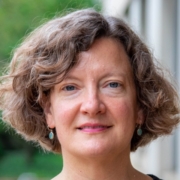Christine Walley is the SHASS Dean’s Distinguished Professor of Anthropology and Head of Anthropology at the Massachusetts Institute of Technology in the U.S.. For the past twenty years, I have conducted research in the former steel mill community of Southeast Chicago where I grew up. This work includes an auto-ethnographic book, Exit Zero: Family and Class in Post-Industrial Chicago (2013), and a documentary film Exit Zero: An Industrial Family Story (2016) made with filmmaker Chris Boebel (https://exitzeroproject.org/). I am also the Director of a collaborative, community-based project about deindustrialization called The Southeast Chicago Archive and Storytelling Project (SECASP) (www.sechicagohistory.org).
Project statement:
Christine Walley is the SHASS Dean’s Distinguished Professor of Anthropology and Head of Anthropology at the Massachusetts Institute of Technology in the U.S.. For the past twenty years, I have conducted research in the former steel mill community of Southeast Chicago where I grew up. This work includes an auto-ethnographic book, Exit Zero: Family and Class in Post-Industrial Chicago (2013), and a documentary film Exit Zero: An Industrial Family Story (2016) made with filmmaker Chris Boebel (https://exitzeroproject.org/). I am also the Director of a collaborative, community-based project about deindustrialization called The Southeast Chicago Archive and Storytelling Project (SECASP) (www.sechicagohistory.org).
I am currently working on two projects. As the Director of the Southeast Chicago Archive and Storytelling Project, I continue to partner with the all-volunteer Southeast Chicago Historical Museum. This collaboration highlights objects saved by residents of this multiracial former steel mill region – and the stories residents told about these objects – to explore history from working-class viewpoints. SECASP includes a digital archive and a series of four multimedia documentaries built around these donated objects. The documentaries explore such topics as immigration/migration, labor history, the impact of the mill closings, and industrial pollution. This deindustrialization multimedia project has taken a decade to create and has involved a dedicated team of 12-15 professionals and volunteers.
Many strands of my work revolve around how environmental and health questions are bound up with both industrial and deindustrialized spaces. This includes a joint research project with Arthur McIvor that examines the long-term, multi-generational impacts of living in deindustrialized regions. We are interested in health effects from both occupational illness and the loss of employment as well as from living in toxic environments where care-giving responsibilities fall disproportionately on women. I have also worked with environmental groups within Southeast Chicago as they combat legacy pollution from prior industrial sites and landfills as well as newer industries that continue to pollute but offer few jobs due to automation. My newer work explores questions of what a “just transition” might entail in deindustrialized communities in a context of climate change.





